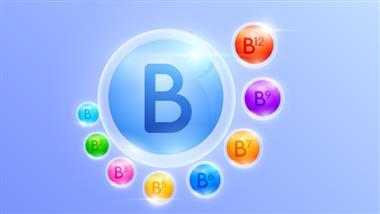Story at-a-glance
- B vitamins are essential for daily energy production, nerve function, and brain health, but your body does not store most of them, making steady intake key
- Deficiencies in individual B vitamins cause specific problems, including nerve damage from thiamine shortage, skin and mouth issues from riboflavin deficiency, and mood changes or anemia from low B6
- Too little folate raises cancer risk, while too much folic acid from supplements or fortified foods fuels the growth of precancerous cells, showing that balance is key
- Certain groups — including older adults, vegans, gastric bypass patients, and those taking medications like metformin or omeprazole — face higher risks of B vitamin deficiencies
- Alcohol, overcooking, and processed foods destroy B vitamins, making it important to rely on whole foods, balanced supplements if necessary, and careful cooking to protect your energy and long-term health
Your body runs on B vitamins the way a car runs on fuel — without them, everything slows down, sputters, and eventually stalls. Unlike fat-soluble vitamins that linger in your tissues, B vitamins wash out quickly, which means you need to replace them daily to keep your cells working. They’re the quiet helpers behind energy production, nerve function, and even mood balance, and when you don’t get enough, the warning signs show up fast: fatigue, brain fog, irritability, and tingling in your hands or feet.
These nutrients are packed into everyday foods like grass fed beef, liver, mushrooms, spinach, and pastured eggs, yet even with a varied diet, modern habits often work against you. Alcohol drains thiamine, food processing strips away riboflavin and folate, and overcooking destroys delicate compounds your body depends on. Supplements help fill the gaps, but taking too much of one vitamin while ignoring the others creates its own problems.
Because these nutrients touch nearly every system in your body, from blood production to brain health, the consequences of deficiency are severe. That’s why scientists have spent decades studying how shortages lead to diseases and how balance — not excess — protects long-term health. With that foundation in mind, let’s look at what research uncovered about how B vitamins keep your energy systems running at full capacity.
Energy, Brain Health, and the Overlooked Power of B Vitamins
A paper published in The Permanente Journal examined all eight members of the B complex — thiamine (B1), riboflavin (B2), niacin (B3), pantothenic acid (B5), pyridoxine (B6), biotin (B7), folate (B9), and cobalamin (B12).1 These vitamins were shown to be essential for both breaking food down into usable energy and building key compounds inside cells. Because they’re water-soluble and not stored in your body, they should be replenished every day.
•Deficiencies were linked to specific and severe outcomes — Low levels of these vitamins trigger widespread dysfunction. Thiamine deficiency was tied to nerve and brain disorders such as Wernicke-Korsakoff syndrome, characterized by confusion, poor coordination, and permanent memory loss.
Riboflavin deficiency caused skin problems, mouth sores, fatigue, and anemia. Niacin deficiency led to pellagra, known for the “three Ds” — dermatitis, diarrhea, and dementia. Even moderate deficiencies slowed energy metabolism, leaving people with weakness, low concentration, and depression.
•Thiamine protects your nerves and muscles — Your body turns thiamine into an active form that’s needed to turn food into energy and to make a brain chemical that controls memory and muscle movement. Without it, you risk brain fog, memory loss, and muscle weakness. Heavy drinking makes this worse because alcohol blocks thiamine from being absorbed and used.
•Riboflavin helps other vitamins do their jobs — Riboflavin acts like a switch that activates other B vitamins, including niacin, folate, and B6. Without enough riboflavin, those vitamins lose their power too. It also defends your cells from damage during energy production. The review showed that adding riboflavin back into the diet reversed problems like fatigue and skin issues caused by deficiency.
•Niacin keeps your DNA and cholesterol in balance — Niacin comes from food or the amino acid tryptophan and helps make compounds that repair DNA and regulate fats in your blood. Without enough, people develop pellagra, marked by diarrhea, dementia, and skin rashes. But too much (over 3 grams a day) harms your liver and causes burning flushes. The safer form, nicotinamide, was shown to treat pellagra without those side effects.
•B6 supports your mood and blood health — In its active form, B6 helps make brain chemicals that regulate mood. Low B6 is tied to anemia, seizures in infants, and depression in adults. The paper also warned that common medications like anticonvulsants and the Parkinson’s disease drug levodopa block B6 activity, making deficiencies more likely if you take them.
Lack of B Vitamins Shuts Down Your Energy Supply
Missing B vitamins means your cells can’t properly run the citric acid cycle and electron transport chain — your body’s main ways of turning food into energy.2 Neurons, which are the hungriest cells in your body, are the first to fail. That explains why deficiencies often start with neurological problems like brain fog, nerve pain, or confusion.
•Replacing them early prevents lasting harm — The researchers stressed that symptoms such as fatigue, low mood, or nerve tingling can be reversed if you restore B vitamins quickly. In serious thiamine deficiency, they even recommended IV treatment before eating carbs to prevent brain damage. Riboflavin and niacin shortages were also shown to be correctable with diet or supplements.
•The takeaway is steady intake, not mega-doses — Most B vitamins are safe, but your body flushes out the extras. The problem isn’t usually taking too much in one day — it’s not getting enough every day. The focus should be on consistent daily intake from whole foods and modest, balanced supplements if necessary.
The Overlooked Risks of B Vitamin Imbalances
According to Tufts University, vitamin B deficiencies raise cancer concerns, while excess intake creates new risks.3 People who chronically consume too little folate face a significantly higher risk of colon cancer, with possible links to pancreatic and post-menopausal breast cancers as well. Joel Mason, senior scientist at Tufts, explained that folate acts like “a fertilizer for cell growth,” meaning that while normal levels protect your DNA, too much folic acid could accelerate the growth of precancerous cells into tumors.
The terms folate and folic acid are often used interchangeably, but they’re not the same. Folic acid is the synthetic version of folate, or vitamin B9. While folate is found naturally in foods like leafy greens, folic acid is found in supplement form as well as in fortified foods, such as cereal and bread. Keep in mind that it’s extremely rare to get too much folate from foods, but it is possible to get too much folic acid from supplements and fortified foods.
•Certain groups were identified as more vulnerable — Older adults experience reduced absorption of vitamin B12 as part of the aging process, leaving them more prone to anemia, fatigue, and neurological decline. Vegans face steady risk because vitamin B12 is not found in plant foods, making supplementation or fortified options essential.
People who had undergone gastric bypass surgery were also flagged, as changes in their digestive system often caused deficiencies — especially of thiamine, leading to weakness, confusion, eye problems, or permanent nerve damage if untreated.
•Common medications interfered with absorption — Drugs that many people rely on daily, such as the diabetes medication metformin and acid-blockers like omeprazole, directly inhibited the body’s ability to absorb vitamin B12. Over time, this meant higher chances of developing nerve issues, fatigue, and even irreversible neurological damage. Mason emphasized that long-term use of these drugs could quietly increase deficiency risk, even when diets seemed adequate.
•Toxicity from supplementation was highlighted with real-world cases — The article described how women in the 1980s who used very high doses of vitamin B6 (up to 200 milligrams (mg) daily) for perimenstrual pain developed permanent nerve damage, compared with the safe daily allowance of about 2 mg.
Similarly, high doses of niacin, sometimes prescribed for cholesterol, triggered severe flushing, rashes, and itching. These examples reinforced the warning that “more is not necessarily better in all instances.”
•The overall message pointed to moderation and steady intake — Adequate amounts of B vitamins are important for energy, mood, nerve health, and disease prevention, but pushing intake too far in either direction — too little or too much — creates harm. The guidance was simple: a well-rounded diet or a modest supplement is often enough to meet daily needs, while megadoses or overlapping supplements introduce unnecessary risks.
Everyday Habits That Drain Your B Vitamin Levels
A report from Victoria State Government’s Better Health Channel emphasized how fragile B vitamins really are.4 These nutrients are easily destroyed by alcohol, overcooking, and food processing. White flour and other refined foods lose the nutrient-rich outer layers where B vitamins naturally occur. In other words, the way your food is processed or prepared often strips away what your body desperately needs.
•Your body can’t store most of these vitamins for long — Unlike fat-soluble vitamins that linger in your liver and fat tissues, the B group (with the exception of B12 and folate) should be eaten consistently. The report warned that “a person who has a poor diet for a few months may end up with B-group vitamins deficiency.” That often translates into feeling run down, irritable, and weak in a surprisingly short window of time if your diet is lacking.
•Deficiency symptoms are serious and differ by vitamin — Thiamin shortage triggered beriberi, a disease that damages nerves, muscles, and the heart. Riboflavin deficiency showed up as cracked lips, sore throats, and skin disorders. Pyridoxine deficiency was linked to anemia, mood disturbances, and seizures in infants. Each vitamin deficiency expressed itself differently, but all carried a heavy toll on energy, mood, and physical function.
•Interactions between vitamins made balance key — The Better Health Channel highlighted how folate and B12 depend on each other to work properly. Overloading on one while neglecting the other causes cascading problems, including anemia and nerve injury. This means your strategy should not be to megadose a single B vitamin but to ensure consistent, balanced intake across the whole B family.
Simple Steps to Keep Your B Vitamins in Balance
If you want to protect your energy, brain function, and overall health, you need to think about how you’re replenishing B vitamins every single day. These nutrients don’t stay stored in your body, and if you’re not paying attention, a deficiency creeps up faster than you realize.
Fortunately, supporting your B vitamin status doesn’t require complicated strategies. With a few practical adjustments, you can make sure your cells have what they need to produce energy and keep your nervous system strong. Here are five straightforward steps to take:
1.Rely on whole foods first — I always recommend that you get your B vitamins from real food as much as possible. Grass fed beef, liver, pastured eggs, mushrooms, leafy greens, and asparagus give you a broad spectrum of B vitamins in their most usable forms. If you’re a plant-based eater, you need to pay special attention to vitamin B12 because it’s only found in animal foods — fortified foods or a balanced supplement help fill that gap.
2.Use a balanced B-complex supplement when needed — If your diet isn’t giving you enough variety, a high-quality B-complex is an easy safeguard. I recommend 50 mg of niacinamide (a safe form of vitamin B3) three to four times a day, spaced evenly, to keep your NAD⁺ levels steady. This supports energy production and protects your cells from stress.
3.Space your intake throughout the day — Because B vitamins are water-soluble and flush out of your body quickly, it makes sense to take them in small amounts at different times instead of one large dose. Think of it like sipping water instead of chugging a gallon all at once — it keeps your system balanced and consistently fueled.
4.Watch your cooking and alcohol habits — Long cooking times, boiling food, and excess alcohol use all destroy B vitamins before they even reach your bloodstream. If you’re serious about preserving these nutrients, cook vegetables lightly, avoid overcooking meats, and cut back on or eliminate alcohol. Even moderate drinking blocks thiamine and B12 absorption, which directly robs you of energy and brain health.
5.Keep your intake balanced — One of the biggest mistakes many people make is megadosing on a single B vitamin while ignoring the rest. For example, too much folic acid masks a B12 deficiency, which silently damages your nerves. Aim for variety: leafy greens for folate, grass fed beef for B12, bananas and potatoes for B6, mushrooms for B3, and pastured eggs for riboflavin. Balance is the key to getting the benefits without the risks.
FAQs About B Vitamins
Q: Why do I need B vitamins every day?
A: B vitamins are water-soluble, meaning your body doesn’t store most of them for long. You have to replenish them daily to keep your cells making energy, protecting your nerves, and supporting mood and brain health. Without them, symptoms like fatigue, brain fog, and irritability show up quickly.
Q: What are the biggest risks if I’m deficient in B vitamins?
A: Deficiency leads to different problems depending on which vitamin is low. Thiamine deficiency causes nerve and brain damage, riboflavin shortage brings skin and mouth problems, and low niacin results in pellagra with diarrhea, dementia, and skin rashes. B6 and B12 deficiencies affect mood, blood health, and memory. In severe cases, these deficiencies cause permanent damage.
Q: Can I take too many B vitamins?
A: Yes. While your body flushes out small excess amounts, megadoses cause harm. High B6 intake has caused permanent nerve damage, and large amounts of niacin have triggered liver problems and painful flushing. Too much folic acid also masks a B12 deficiency, allowing silent nerve injury. Balance — not excess — is the safest approach.
Q: Who is most at risk for B vitamin deficiencies?
A: Older adults often absorb less B12 as they age, vegans lack natural B12 sources in their diet, and gastric bypass patients are prone to thiamine and other deficiencies. People taking common drugs like metformin or omeprazole also absorb less B12, raising the risk of fatigue, anemia, and nerve damage over time.
Q: What’s the best way to keep my B vitamin levels healthy?
A: Start with food: grass fed beef, liver, mushrooms, leafy greens, eggs, and asparagus are rich sources. If you’re vegan, add fortified foods or a supplement for B12. Take a balanced B-complex if your diet is lacking, and spread doses throughout the day. Avoid overcooking food and limit alcohol, which both destroy B vitamins. The goal is steady, balanced intake from whole foods and modest supplements if necessary.







